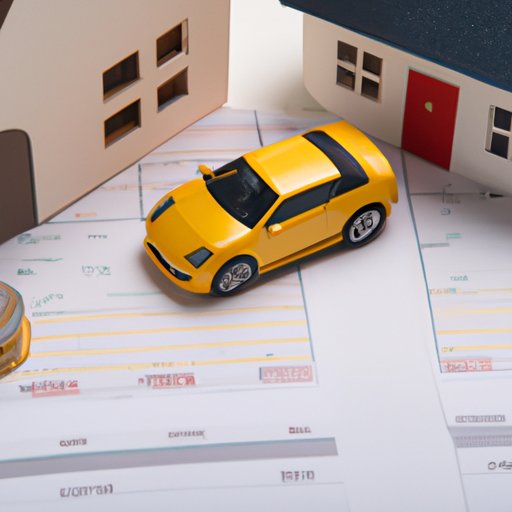Introduction
If you’re struggling to pay off your car loan, you may be considering using home equity to pay it off. Home equity is the difference between the value of your home and how much you owe on it. Using home equity to pay off a car loan can be a good way to save money in the long run. However, there are pros and cons to this approach that you should consider before making a decision.
Analyzing the Pros and Cons of Using Home Equity to Pay Off a Car Loan
It’s important to understand the advantages and disadvantages of using home equity to pay off a car loan before making a decision. Here are some of the pros and cons of using home equity to pay off your car loan:
Advantages of Using Home Equity
One of the main advantages of using home equity to pay off your car loan is that you may be able to reduce your monthly payments. This can help free up money for other expenses or debt payments. Additionally, if you have a high-interest rate car loan, you may be able to reduce the amount of interest you pay by taking out a home equity loan with a lower interest rate. Furthermore, using home equity to pay off your car loan may allow you to deduct the interest from your taxes.
Disadvantages of Using Home Equity
One of the main drawbacks of using home equity to pay off a car loan is that it puts your home at risk. If you fail to make payments on the loan, you may be at risk of foreclosure. Additionally, you may also be subject to additional fees or penalties if you default on the loan. Furthermore, if you take out a home equity loan, you may end up owing more than you originally did on your car loan due to interest and fees.
Exploring Alternative Options to Paying Off Your Car Loan
If you don’t want to use home equity to pay off your car loan, there are other options available. Here are some alternatives to consider:
Refinancing the Loan
If you have a high-interest rate car loan, you may be able to refinance the loan and get a lower interest rate. Refinancing could potentially save you money in the long run. However, you should make sure to shop around for the best rates and consider any additional fees or penalties associated with refinancing.
Selling the Vehicle
Another option is to sell the vehicle and use the proceeds to pay off the loan. You may be able to get a better price for the vehicle if you sell it yourself. However, you should make sure to check with the lender to make sure they will accept payment in full before selling the vehicle.
Negotiating with Lenders
If you’re having trouble making payments on your car loan, you may be able to negotiate with the lender to lower the interest rate or extend the repayment period. This could potentially help you save money in the long run. However, you should make sure to read the terms of the loan carefully before agreeing to any changes.

Examining the Financial Implications of Using Home Equity to Pay Off a Car Loan
When deciding whether to use home equity to pay off a car loan, it’s important to consider the financial implications. Here are some factors to consider:
Interest Rates
The interest rate on a home equity loan is typically lower than the interest rate on a car loan. This means that you may be able to save money in the long run by using home equity to pay off your car loan. However, it’s important to make sure you understand the terms of the loan and compare different lenders to get the best rate.
Tax Implications
Using home equity to pay off a car loan may also have tax implications. Depending on your situation, you may be able to deduct the interest from your taxes. However, it’s important to consult a tax professional to make sure you understand the tax implications of using home equity to pay off your car loan.

Considerations When Deciding Whether to Use Home Equity to Pay Off a Car Loan
When deciding whether to use home equity to pay off a car loan, there are several factors to consider. Here are some questions to ask yourself:
How Much Home Equity Do You Have?
Before using home equity to pay off a car loan, it’s important to make sure you have enough home equity to cover the cost of the loan. If you don’t have enough equity, you may need to consider other options such as refinancing or selling the vehicle.
What Are Your Other Financial Obligations?
It’s also important to consider your other financial obligations before using home equity to pay off a car loan. Make sure you have enough money to cover your other debts and expenses before taking out a home equity loan.

Understanding the Impact of Interest Rates on Paying Off a Car Loan With Home Equity
When using home equity to pay off a car loan, it’s important to understand the impact of interest rates. Here are some factors to consider:
Fixed vs. Variable Interest Rates
Home equity loans typically have either fixed or variable interest rates. Fixed interest rates remain the same throughout the life of the loan, while variable interest rates can change over time. It’s important to understand the differences between the two before taking out a home equity loan.
Long-Term vs. Short-Term Loans
Home equity loans can also be either long-term or short-term. Long-term loans typically have lower interest rates, but they also require larger monthly payments. Short-term loans typically have higher interest rates, but they also require smaller monthly payments. It’s important to consider both options before taking out a home equity loan.
Common Mistakes to Avoid When Using Home Equity to Pay Off a Car Loan
When using home equity to pay off a car loan, it’s important to avoid making common mistakes. Here are some mistakes to avoid:
Not Considering All Options
It’s important to make sure you consider all of your options before deciding to use home equity to pay off your car loan. Make sure you weigh the pros and cons of each option before making a decision.
Not Shopping Around for the Best Rate
When taking out a home equity loan, it’s important to shop around for the best rate. Different lenders may offer different rates, so it’s important to compare different lenders to make sure you get the best rate.
Not Understanding the Terms of the Loan
It’s also important to make sure you understand the terms of the loan before taking out a home equity loan. Make sure you understand the interest rate, repayment period, and any associated fees or penalties before signing any paperwork.
Conclusion
Using home equity to pay off a car loan can be a good way to save money in the long run. However, there are pros and cons to this approach that you should consider before making a decision. It’s important to understand the financial implications of using home equity to pay off a car loan, such as interest rates and tax implications. Additionally, it’s important to consider your other financial obligations and make sure you understand the terms of the loan before taking out a home equity loan. By understanding the pros and cons and exploring all of your options, you can make the best decision for your situation.
(Note: Is this article not meeting your expectations? Do you have knowledge or insights to share? Unlock new opportunities and expand your reach by joining our authors team. Click Registration to join us and share your expertise with our readers.)
